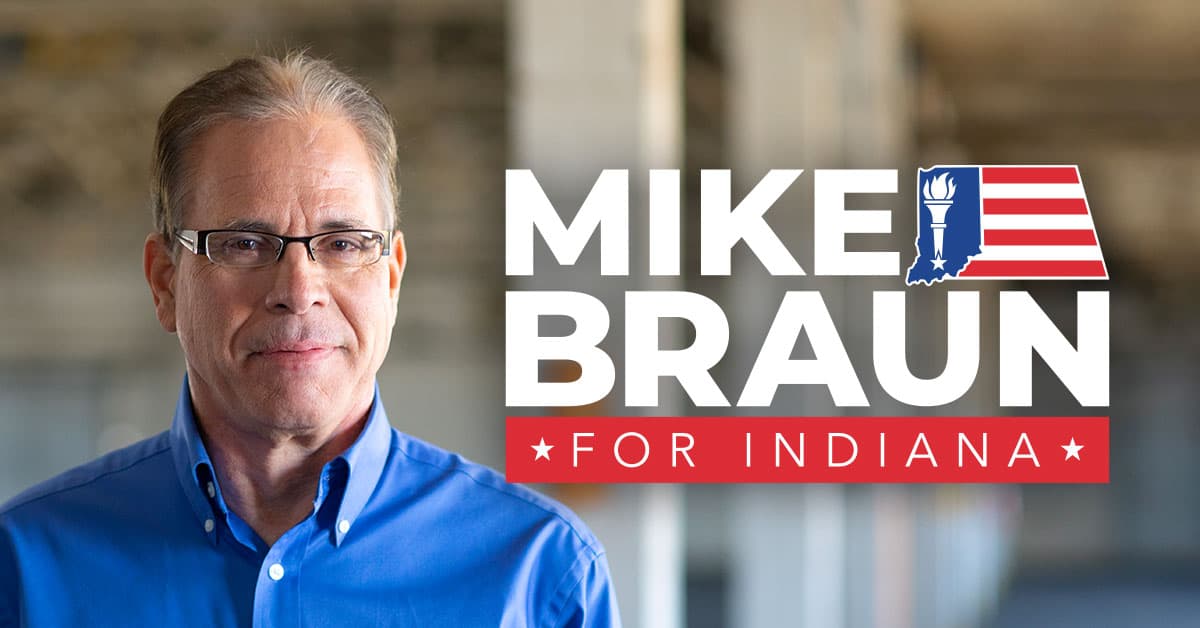Former Senator Mike Braun (R) wins election for governor of Indiana. Photo courtesy of Mike Braun for Indiana.
ERIKA KOVACH | STAFF REPORTER | ekovach@butler.edu
Senator Mike Braun (R) will be the next governor of Indiana, overtaking opponents Jennifer McCormick (D) and Libertarian Donald Rainwater. He will be sworn in as the 52nd governor of Indiana for a four-year term, and uphold the current Republican majority in this executive position and both chambers of the state legislature.
While many turned their attention to the national presidential election this week, the position of Indiana governor was also up on the ballot — perhaps with more significant impacts on locals than one may realize.
The candidates
This year’s gubernatorial race included three candidates — Senator Braun (R), former Superintendent of Public Instruction McCormick (D) and Libertarian Rainwater, a Navy veteran and software engineer.
Braun has served as a U.S. senator for the past six years. In the Senate, he serves as the lead Republican on the Aging Committee, as well as positions in the Agricultural Committee, Budget Committee and the Health, Education, Labor and Pensions Committee (HELP). Before taking on his senate position in 2018, he was the founder and CEO of Meyer Distributing in his hometown of Jasper. He previously worked as both a farmer and a self-proclaimed entrepreneur.
Candidate McCormick (D) served as the 44th Superintendent of Public Instruction in the state of Indiana. She came into the position in 2016 after a career in Yorktown Community Schools for almost 20 years as a teacher, principal and superintendent.
Rainwater ran as a Libertarian candidate and ran previously in the 2020 gubernatorial race. He served in the U.S. Navy from 1982-1990 and previously worked as both an IT project manager and software engineer.
Campaign issues
Divided largely along party lines, the candidates this year are focused on various issues and stances applicable to the people of Indiana.
Despite candidates’ differences, Rhea Myerscough, assistant professor of political science, highlighted some of the consistencies one might see across their platforms.
“[Regarding] the two major party candidates, they’re speaking a lot about agriculture policies and rural issues,” Myerscough said. “There’s a lot more attention to that than I think we’re getting at the national level, particularly in the general election.”
Some campaigns, such as McCormicks’, have turned their attention to pertinent issues across the country at this time.
“One issue that Jennifer McCormick has really been hitting on — which I think strategically, is a smart move — is reproductive rights,” Myerscough said. “That’s imitated a lot of the national campaign, but it’s also really relevant here, because we [were] one of the first states to pass a near-total abortion ban last summer, [a decision] that’s survived a couple of court challenges so far.”
While McCormick has made her stance as pro-choice clear throughout her campaign, she also pushed Braun to make his opinions more clear.
Regarding Braun’s political affiliation and position in the senate, Myerscough noted that right-wing policies from Republican Governor Eric Holcomb’s administration would likely continue if Braun were to be elected, especially considering the parties’ supermajority in the general assembly.
Junior political science major Brady Stinson is currently interning on Capitol Hill and feels similarly that Brauns’ election may not bring much nuance to the position of governor.
“Regardless of party affiliation, I think Democrats and Republicans alike should look at McCormick and the real issues she’s speaking about,” Stinson said. “Braun has relatively little to show, even in his past six years as a senator.”
Some have raised concerns with Brauns’ running mate, Micah Beckwith. Beckwith is a self-described Christian nationalist, following the belief that America is defined by Christianity and should be governed as such.
Sarah Pawlowski, a junior political science and strategic communication double major, expressed such concerns with Beckwith’s beliefs.
“As a Christian myself, I believe my faith shapes my values and thus impacts my actions, but in a way that compels me to act in love — not accuse my political opponents of having a ‘Jezebel spirit’ or force my religion upon others,” Pawlowski said. “I firmly believe in a separation of church and state and do not trust the Braun ticket to uphold this facet of our democracy.”
Generally speaking, Braun’s platform has focused largely on his previous experiences in the federal government, and also as an entrepreneur. He has discussed pro-life legislation across the state, emphasizing the economy through small business and increasing gun control.
McCormick’s platform has similarly focused heavily on her background as an educator and military mother. She has outlined various economic plans to support individuals.
Rainwater has turned his focus to a more local level, emphasizing the significance of local government and individuals across the state making their voices heard. He has proposed similar plans of stopping the growth of property taxes and legalizing marijuana based on the desires of constituents.
Looking forward
While McCormick lost, early data and news coverage pointed to a close race between herself and Braun. Despite the lack of a “blue wave”, students and faculty feel that eyes on McCormick — even without being elected — might symbolize the beginnings of a shift and lead to more resources for Democratic candidates in the future.
Despite Braun’s victory, Pawlowski feels that the political climate in Indiana is changing from the Republican domination of the last several decades.
“An idea we’re hearing a lot in this election cycle is that Hoosiers are tired of extremism,” Pawlowski said. “I think with this we’re going to see shifts toward more moderate and hopefully liberal candidates and policies.”



